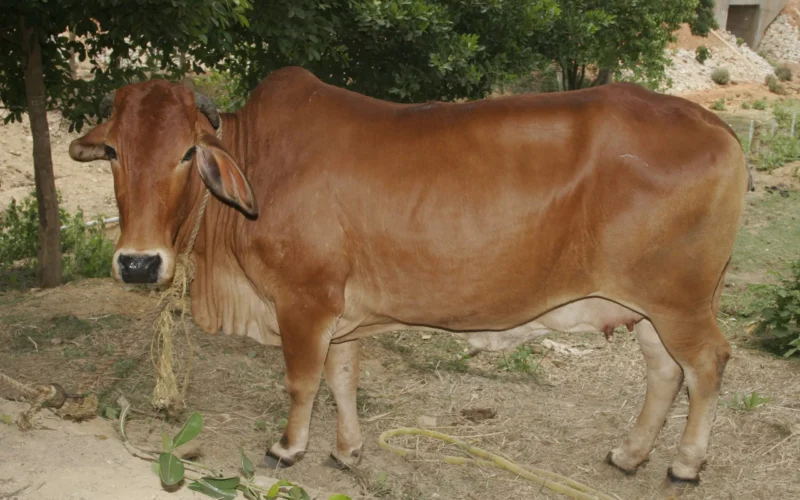The Sahiwal cow is widely regarded as one of the best indigenous dairy breeds from the Indian subcontinent. Known for high milk yield (3000–4000 kg per year) and rich butterfat content (4.5–5.5%), it competes with exotic breeds while retaining the resilience and adaptability of a native breed. Farmers value Sahiwal cattle for profitability, low maintenance, and heat tolerance.
Origin of the Sahiwal Cow
The Sahiwal breed originated in the Punjab region of India and the Sindh province of Pakistan. It is also reared in Bangladesh, Sri Lanka, and other tropical countries. The breed is naturally resistant to heat stress and many tropical diseases, making it ideal for hot climates.
Physical Characteristics
Color: Reddish-brown coat
Build: Compact, sturdy body with a moderate-to-large frame
Weight: 400–600 kg for cows, up to 700 kg in some cases
Height: 130–140 cm at the withers
Horns: Short to medium, slightly curved outward (up to 50 cm)
Udder: Well-developed, enabling efficient milking
Milk Quality: 4.5–5.5% butterfat, rich and creamy
Fertility
Early maturity – heifers reach puberty at 12–15 months
High conception rates and regular 21-day estrus cycles
Efficient calving intervals for sustainable dairy production
Milk Production
Average per lactation: 2,000–3,000 kg (some exceed this)
Lactation period: 250–300 days
Daily milk yield: 8–12 liters under optimal care
Milk is rich in flavor and nutrients, ideal for ghee, paneer, and other dairy products.
Calves
Birth weight: 20–25 kg
Calm, docile temperament
Rapid growth with proper feeding – reaching 100–150 kg at 6–8 months
Excellent feed conversion efficiency
Price in India
A healthy Sahiwal cow typically costs ₹60,000–₹75,000, depending on age, milk yield, and overall health.
Management & Care
Housing
Shelter must protect from rain, wind, and extreme temperatures
80–100 sq. ft. per cow
Comfortable bedding (straw or sawdust), proper drainage, and ventilation
Clean feeding and watering facilities
Secure fencing to prevent wandering and protect from predators
Feeding
Forage: High-quality green fodder (alfalfa, clover, maize) – 2–2.5% of body weight daily
Concentrates: 0.5–1% of body weight (especially during lactation)
Minerals & Vitamins: Mineral blocks or loose supplements
Water: 20–30 gallons per day
Feeding Schedule: Small, frequent meals for better digestion
Health & Vaccination
Common diseases: mastitis, foot rot, respiratory infections, parasitic infestations
Pest control: regular cleaning, fly control measures, and insecticides when necessary
Vaccinations: BVD, IBR, BRSV, leptospirosis, clostridial infections (as per vet advice)
Quarantine new animals to prevent disease spread
Quick Facts
Best in Punjab: Sahiwal suits Punjab’s climate perfectly
Lifespan: 20–24 years
Identification: Reddish-brown color, loose skin (lola), short horns, humped back
Comparison with Gir Cow: Sahiwal gives more milk and is hardier in heat
Summary
The Sahiwal cow stands out as the highest milk-producing indigenous breed in India. It combines resilience, rich milk quality, and adaptability to hot climates, making it a top choice for profitable dairy farming. With proper housing, nutrition, and health care, Sahiwal cows can provide farmers with consistent, high-quality milk for years.

